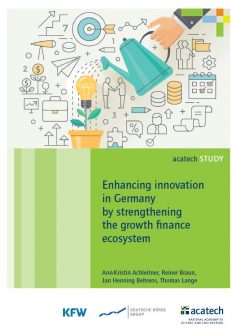What start-ups need to grow into successful companies

Munich, 10 May 2023
Growth conditions for start-ups was the focus of a virtual event in the SENAT digital series. acatech Vice-President Ann-Kristin Achleitner (Technical University of Munich) and member of the acatech Senate Christoph Schuh (Lakestar) gave an introduction into the topic and Gerhard Kussel (Head of Program Area Economics, Education and Employment at acatech) moderated. One conclusion drawn from the event is that the research is well-positioned; there is no shortage of ideas or entrepreneurship. However, for start-ups to grow into market champions, they need better access to venture capital.
A weak point in the German innovation system
The sluggish growth of start-ups in Germany is a weak point in the German innovation system, said Ann-Kristin Achleitner in her opening address. Back in 2019 she led an acatech working group that came up with courses of action, culminating in the study “Enhancing innovation in Germany by strengthening the growth finance ecosystem”, a reference point for innovation policy strategies to nurture start-ups. In essence, the growth phase of young, high-tech companies must be supported by providing better access to venture capital and cultivating good contacts with established companies.
How good is the European ecosystem?
The German and European ecosystem of innovative start-ups is starting from a good base, said Christoph Schuh. There are excellent universities and research institutions throughout Europe. In addition to teaching and research, many universities facilitate and support entrepreneurship. There are public funding programmes and unicorns do exist; i.e. start-ups that reach a valuation of USD 1 billion without being listed on the stock exchange. It is worth noting that not only cities you would expect to produce unicorns, like Berlin, Barcelona and London, have done so: 300 unicorns sprouted up in 100 different cities in 2021.
Where Europe is lagging behind internationally
However, said Christoph Schuh, Europe is still lagging behind the U.S. and China. Almost all of the new world market leaders have come out of these two countries. This makes Europe even more dependent; especially when it comes to infrastructure in the areas of digitalisation, payment systems and the capital market.
In Europe, the innovation chain from research to successful application and start-up begins auspiciously but then enters a lull: the research and also patent applications are on a par with the U.S. according to Christoph Schuh. However, it’s a very different story when it comes to the percentage of entrepreneurs in the overall population: not even half as many as in the U.S. Owners of fully fledged tech unicorns are rarer again in Germany. One reason is the lack of venture capital for the growth phase of German start-ups. Growth finance per capita is more than seven times greater in the U.S. than in Germany.
The heyday of company start-up and growth in Europe was between the 1950s and 1970s. In those days, banks funded 60 per cent of economic power. Things are different today: in the past 20 years, the U.S. has invested many times more than Europe in tech-sector start-ups, leaving Europe far behind. According to Christoph Schuh, new technology companies account for 34 per cent of U.S. GDP since 1995 while in Germany tech start-ups only generate 1.3 per cent of GDP.
The key to growth
According to a Lakestar study, there is an annual growth financing gap of around EUR 80 to 100 billion in venture capital and public funds. Ann-Kristin Achleitner also emphasised the importance of the interface with industry: greater emphasis must be placed on investment in new technologies.
Working with universities also remains important. One conclusion the discussion drew was that start-ups already play an important role at many universities and among their students. The entrepreneurial spirit is growing in research.
Discussion and outlook
One thing participants in the event agreed on was that more start-ups and improvements in their conditions for growth are key tasks for science, industry and policymakers. Ann-Kristin Achleitner gave an outlook and announced that the new series “Germany’s Innovation System” would touch on Germany’s start-up system in the future. The first issue will focus on the skills shortage and will be published on 10 June 2023.
About the SENAT digital series of events
The acatech Senate comprises well-known persons from leading, technology-oriented companies, associations as well as the major science organisations and from politics. They advise the Academy on matters of strategy, and their experience in industry feeds into the projects. In the SENAT digital series of online events, approximately once every quarter the spotlight is shone on a topical issue from a business, political, scientific and social perspective. The one-hour format is intended for all acatech Senators as well as selected guests.



